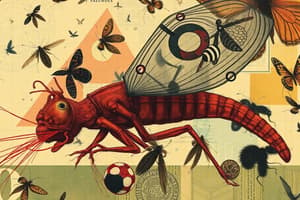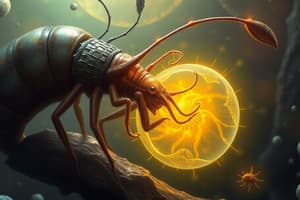Podcast
Questions and Answers
What is an endoparasite?
What is an endoparasite?
A parasite that lives within the body of the host and causes an infection.
Which of the following is an example of an ectoparasite?
Which of the following is an example of an ectoparasite?
- Plasmodium
- Lice (correct)
- Toxoplasma gondii
- Naegleria fowleri
A definitive host is where the adult parasite lives and undergoes asexual reproduction.
A definitive host is where the adult parasite lives and undergoes asexual reproduction.
False (B)
What type of parasite cannot exist without a host?
What type of parasite cannot exist without a host?
Which of the following is an example of an accidental parasite?
Which of the following is an example of an accidental parasite?
A reservoir host maintains a parasitic infection by harboring the parasite and acts as a source of infection for other _____ hosts.
A reservoir host maintains a parasitic infection by harboring the parasite and acts as a source of infection for other _____ hosts.
What is the role of an intermediate host?
What is the role of an intermediate host?
What is a paratenic host?
What is a paratenic host?
Flashcards are hidden until you start studying
Study Notes
Parasites
- Parasites are organisms that rely on a living host for sustenance and survival, often multiplying within the host.
- They are usually classified as Protozoa (single-celled) or Helminths (multicellular).
- Ectoparasites live on the host's body surface, such as lice, ticks, and mites.
- Endoparasites live within the host's body, causing infections.
Parasitic Classification
- Obligate parasites require a host for survival, like Toxoplasma gondii and Plasmodium.
- Facultative parasites can live as parasites or independently, exemplified by Naegleria fowleri.
- Accidental parasites infect an unusual host, such as Echinococcus granulosus causing hydatid cysts in humans.
- Aberrant parasites infect a host where they cannot fully develop, like Toxocara canis (dog roundworm) in humans.
Host Types
- Definitive host: The host where the adult parasite lives and reproduces sexually, like mosquitoes in malaria.
- Intermediate host: Hosts harboring larval stages or undergoing asexual reproduction, sometimes multiple hosts are needed for different larval stages.
- Reservoir host: Maintains a parasitic infection in an area, serving as a source for susceptible hosts, like dogs in hydatid disease.
- Accidental host: A host not typically infected by the parasite, such as humans for cystic echinococcosis.
- Paratenic host: A host where the parasite remains viable but doesn't develop further, like fish for the D.latum plerocercoid larva.
Studying That Suits You
Use AI to generate personalized quizzes and flashcards to suit your learning preferences.




